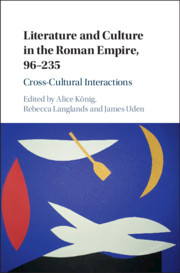Book contents
- Literature and Culture in the Roman Empire, 96–235
- Literature and Culture in the Roman Empire, 96–235
- Copyright page
- Contents
- Figures
- Contributors
- Preface
- Timeline
- Abbreviations
- Map
- Introduction
- Part I Refiguring Roman and Greek Interactions
- Chapter 1 Beyond Romans and Others
- Chapter 2 The Noise-Lovers
- Chapter 3 Plutarch and Roman Exemplary Ethics
- Chapter 4 Patronage, Cultural Difference and Literary Interactivity
- Chapter 5 The Romance of Republican History
- Chapter 6 Tactical Interactions
- Part II Imperial Infrastructure: Documents and Monuments
- Part III Cultural Translation and Transformation
- References
- Index
Chapter 5 - The Romance of Republican History
Narrative Tension and Resolution in Florus, Appian and Chariton
from Part I - Refiguring Roman and Greek Interactions
Published online by Cambridge University Press: 28 April 2020
- Literature and Culture in the Roman Empire, 96–235
- Literature and Culture in the Roman Empire, 96–235
- Copyright page
- Contents
- Figures
- Contributors
- Preface
- Timeline
- Abbreviations
- Map
- Introduction
- Part I Refiguring Roman and Greek Interactions
- Chapter 1 Beyond Romans and Others
- Chapter 2 The Noise-Lovers
- Chapter 3 Plutarch and Roman Exemplary Ethics
- Chapter 4 Patronage, Cultural Difference and Literary Interactivity
- Chapter 5 The Romance of Republican History
- Chapter 6 Tactical Interactions
- Part II Imperial Infrastructure: Documents and Monuments
- Part III Cultural Translation and Transformation
- References
- Index
Summary
Two works survive from the mid-second century CE that narrate the complete history of Rome down to Augustus: Florus in Latin and Appian in Greek. They share some remarkable structural features. In particular, rather than adopting a linear annalistic progression for the late Republic, they employ extended separate narratives of, first, the Roman conquests in the century between the Gracchi and Actium, and then the civil wars that occurred at the same time. This chapter examines the distinct rhetorical and narrative techniques that each author uses to rationalize and pursue this approach, and what implicit comment each makes on the contemporary Antonine situation of internal peace and stable borders. It ends by suggesting that these structures have significant analogies with the ‘separated-lovers’ plot type found in Greek erotic novels, notably Chariton’s Chaereas and Callirhoe. It suggests that the tension-and-resolution structure represented by novels presented itself to these two very different historians as a fitting expression of the relationship of the dynamic, plural history of the Republic to the static unity projected by Antonine ideology.
Keywords
- Type
- Chapter
- Information
- Literature and Culture in the Roman Empire, 96–235Cross-Cultural Interactions, pp. 114 - 133Publisher: Cambridge University PressPrint publication year: 2020



